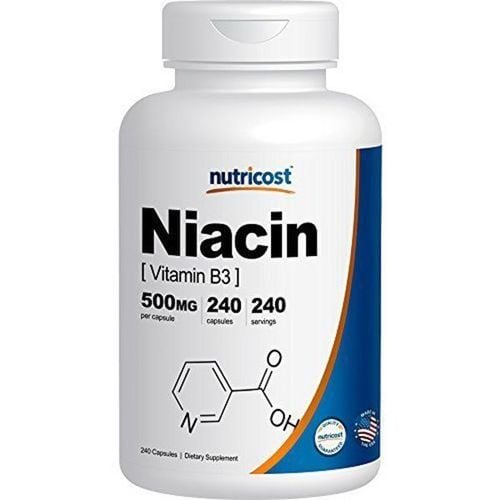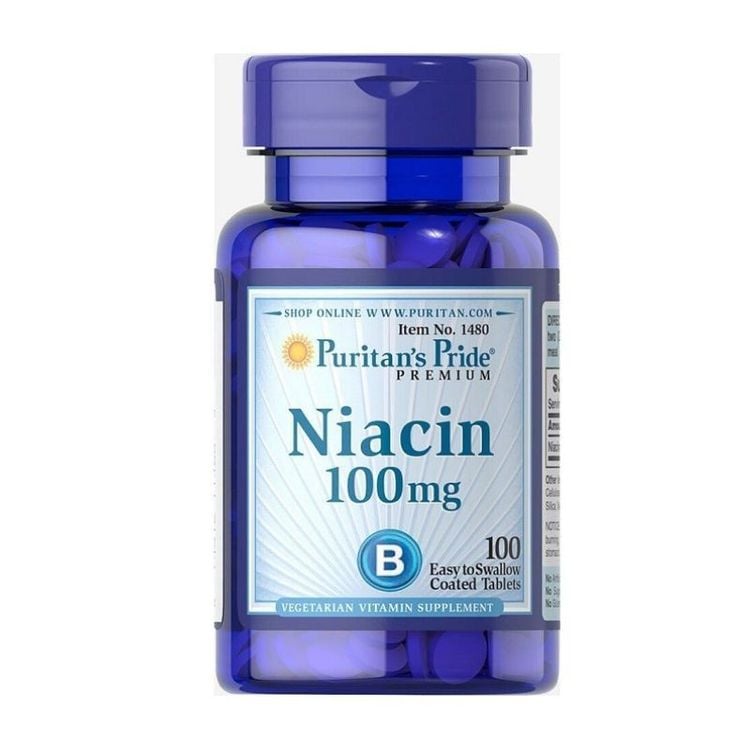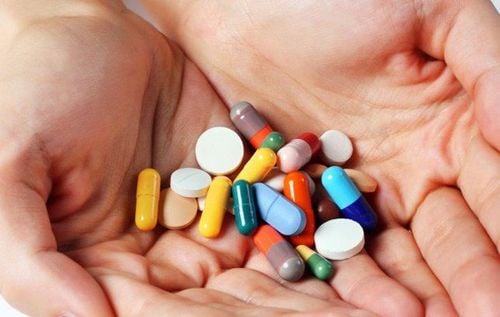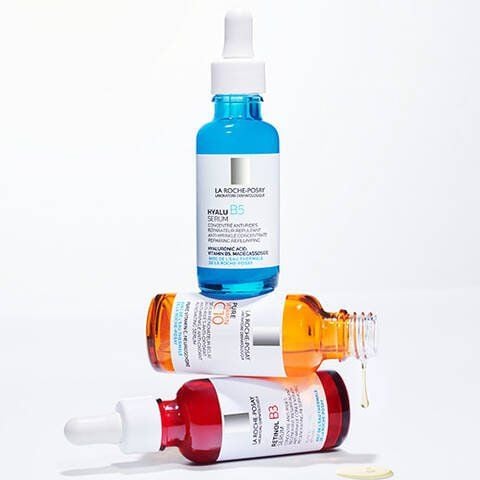This is an automatically translated article.
Niacin deficiency can cause diarrhea, memory loss, red/swollen tongue, and red, flaky skin. Niacinamide (nicotinamide) is a form of vitamin B3 (niacin) and is used to prevent and treat niacin (pellagra) deficiency. Niacinamide is often used instead of niacin because it causes fewer side effects (eg, flushing).
1. What are the effects of Niacin?
Niacin medicine has the main ingredient is niacinamide. Unlike niacin, niacinamide does not help regulate blood fats and is not a substitute for niacin if you are being treated for a problem with blood fats (e.g., high cholesterol).
Vitamin B3 deficiency can occur as a result of a poor diet, certain medical conditions (e.g., alcohol abuse, Hartnup disease, malabsorption syndromes), or period use of certain medications. long (eg Isoniazid). It's best to get your vitamins from healthy foods. Vitamins help support the body in making and breaking down substances that are natural and necessary for good health.
Niacin is contraindicated in the following cases:
Vitamin B3 deficiency (niacin) Niacin is contraindicated in the following cases:
Diabetes Gout Blood clotting disorder increases the risk of bleeding. Angina Low blood pressure Arterial bleeding Stomach ulcers Liver disease Rhabdomyolysis
2. How to use Niacin
Niacin is taken by mouth as directed, usually once or twice daily. If you have any questions about how to use Niacin, ask your doctor.
Do not crush or chew Niacin slow release tablets. Doing so can cause all of the medication to be released at once, increasing the risk of side effects. Also, do not split Niacin tablets unless they are numbered and your doctor tells you to do so.
If you take certain medicines to lower blood fats (such as cholestyramine or colestipol), take niacinamide at least 4 to 6 hours before or after taking these medicines. These products can bind to niacinamide, preventing its absorption.
If your condition persists or worsens after using Niacin, or if you think you may have a serious medical problem, seek immediate medical help.
Laboratory tests such as blood sugar, liver function tests may be done to monitor possible side effects with Niacin use.

Bất cứ có thắc mắc gì về thuốc Niacin, bạn cũng cần tham khảo ý kiến bác sĩ
3. Niacin side effects
Niacinamide is generally well tolerated at usual dosages. Abdominal discomfort, nausea, and diarrhea may occur when you use Niacin. If any of these side effects persist or worsen, tell your doctor right away.
If your doctor has directed you to use this medicine, remember that he or she has judged that the benefit to you is greater than the risk of side effects. Many people use Niacin without any serious side effects.
Tell your doctor right away if any of these rare but very serious side effects of Niacin occur: Black stools, easy bruising/bleeding, persistent nausea/vomiting, arm swelling/ legs, signs of kidney problems, dark urine, vomit that looks like coffee grounds, yellowing eyes or skin.
A serious allergic reaction to Niacin is very unlikely, but seek medical attention immediately if it occurs. Symptoms of a serious allergic reaction to Niacin may include: rash, itching/swelling (especially of the face/tongue/throat), difficulty breathing, severe dizziness.
Below are Niacin side effects by likelihood.
Common side effects of Niacin include:
Temporary blushing of the face and neck Heartburn, Stomach bloating, A stinging sensation in the skin Less common side effects of Niacin include:
Low blood pressure Bad peptic ulcers Itching Dry skin Dizziness Skin rash Nausea Vomiting Diarrhea High blood sugar High blood sugar Fast heartbeat Rare side effects of Niacin include:
Abnormal liver function tests Blurred vision Irregular heartbeat Darkening of the skin Fainting Headache Headache This is not a complete list of Niacin's possible side effects. If you notice other side effects of Niacin not listed above, contact your doctor immediately.

Đầy hơi, ợ chua là một tác dụng phụ của Niacin
4. Measures to prevent side effects of Niacin
Before taking Niacin, tell your doctor if you are allergic to this medicine and any other allergies if any. Niacin products may contain ineffective ingredients that can cause allergic reactions or other problems.
Before using Niacin, consult your doctor if you have: Liver disease, have ulcers.
If you have any of the following health problems, consult your doctor before using Niacin: Bleeding problems (low platelets), diabetes, gout, kidney disease , history of liver disease, history of stomach problems.
If you have diabetes, Niacin may increase your blood sugar. So you need to check your blood sugar regularly and let your doctor know the results. If you have symptoms of high blood sugar such as increased thirst/urination tell your doctor right away, you may need an adjustment in your diabetes medication dose, exercise program or diet.
Tell your doctor if you are pregnant before using Niacin. This medicine passes into breast milk, therefore women who are breastfeeding should consult their doctor before use.
5. Interactions of Niacin
If you are taking Niacin under the direction of your doctor, they may already be aware of any possible drug interactions with Niacin and may be monitoring you for them. During treatment with Niacin, you should not start, stop, or change the dose of any medicine before checking with your doctor.
Before using Niacin products, tell your doctor about all herbal/prescription and over-the-counter products you may use, especially: Anticoagulants (eg: Warfarin, heparin), vitamins/functional foods/other products that also contain niacin or niacinamide.

Thuốc Niacin có thể gây ra tương tác với một số thuốc khác
6. What to do when overdose or forget to take Niacin
If you or someone else has overdosed on Niacin and has severe symptoms such as fainting or difficulty breathing, call 911 immediately.
If you miss a dose of Niacin, take it as soon as you remember. If it is almost time for your next dose, skip the missed dose. Use your next dose of Niacin at the usual time, do not double the usual dose.
Remember that the best way to get vitamins and minerals is from healthy foods. Eat a balanced diet and follow any dietary requirements as directed by your doctor. B vitamins including niacin are found in meat, fish, poultry, whole grain bread/cereal products, and fortified cereals. Use these foods more to increase your niacin intake if you are deficient in this vitamin.
Please dial HOTLINE for more information or register for an appointment HERE. Download MyVinmec app to make appointments faster and to manage your bookings easily.
Reference source: webmd.com













